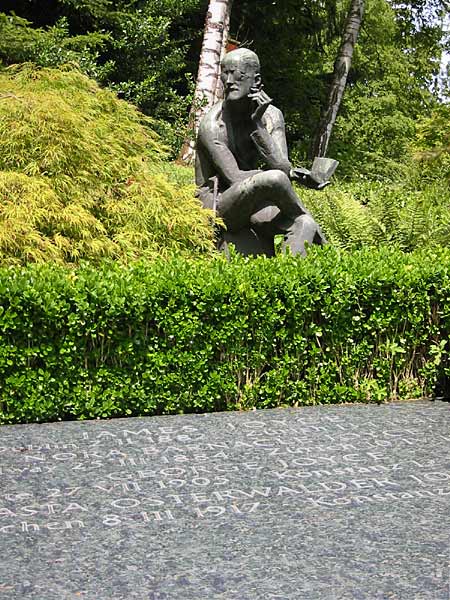
Joyce’s Grave (Lars Haefner CC BY-SA 3.0)
I most associate literary modernism with Joyce and Faulkner, writers who pushed literature’s boundaries further than they had, and perhaps have since, been pushed. Both explored non-standard grammar and syntax, so it’s no coincidence that they were master “dialect writers.”
That being said, I find it hard to separate dialect from literary invention in these authors’ works. Joyce, for instance, mixes Irish pronunciations with “poetic misspellings,” as one finds in this short sentence from Finnegan’s Wake:
A glass of Danu U’Dunnell’s foamous olde Dobbelin Ayle.
Anyone familiar with Hiberno-English will recognize Dobbelin as a local pronunciation of the Irish capital (i.e. dʌbəlɪn or dʊbəlɪn). Foamous is almost certainly a pun suggesting the head atop a well-poured pint. But why Ayle for “Ale?” Contemporary Dublin English differs from Western Hiberno-English in diphthongizing “ale” where, say, a Limerick native has a monophthong (i.e. ɛɪl vs. ɛ:l). But I have no idea if this is what Joyce is indicating. Likewise, U’Dunnell might suggest a Dubliners’ unrounded vowel in LOT words*. Or maybe Joyce just felt like using a “u” there.
As I’m no scholar of modernism, these are layman’s impressions. But such are the puzzles the casual reader encounters when reading Joyce. He loved other languages and Englishes, of course, so these quirks can partially be attributed to those other influences. Take this passage from Ulysses (I’ve highlighted relevant words):
Time they were stopping up in the City Arms pisser Burke told me there was an old one there with a cracked loodheramaun of a nephew and Bloom trying to get the soft side of her doing the mollycoddle playing bézique to come in for a bit of the wampum in her will and not eating meat of a Friday because the old one was always thumping her craw and taking the lout out for a walk.
Old one is a Hiberno-English phrase (sometimes written “aul wan“), as is loodhermaun (from Irish liúdramán). But mollycoddle is not exclusively Irish, Narragansett-derived wampum hardly strikes me Hibernian (although I might be wrong), and bézique is a French card game. Which of these words would an Edwardian Dubliner have used? And which words simply struck Joyce’s fancy?
One can likewise deduce many things about rural Mississippi English in Faulkner’s As I Lay Dying, which I’m currently reading. Particularly intriguing are his use of terms we associate more with the British Isles, such as et (i.e. the past tense of “eat”) and ay (yes). He clearly understood the linguistic terrain of his fictional landscape.
But even in this “accessible” Faulkner work, the line between Mississippi English and mere poetry is hazy. As with The Sound and the Fury, Faulkner writes chapters from the perspective of a character with child-like cognition, in this case the young Vardaman**. Those who have followed the recent conversation about prepositional because might enjoy this Vardaman gripe:
“Why aint I a town boy, pa?” I said. God made me. I did not said to God to made me in the country. If He can make the train, why cant He make them all in town because flour and sugar and coffee. “Wouldn’t you ruther have bananas?”
Vardaman’s meaning seems unambiguous: he wonders why God made him “rural” instead of a “town boy” with access to urban amenities. But is that prepositional “because” part of Vardaman’s dialect? Or is it a Faulknerian creative flourish? Heck, is this even a case of prepositional “because?” (Faulkner might have left a space where another writer might have used ellipses: “why can’t He make them all in town because … flour and sugar and coffee.”)
It doesn’t help that both writers were storytellers prone to mythologizing themselves and their provenances. Where their written idiolects begin and the dialect of their milieus end will be debated for a long time.
*”Ayle,” not unpredictably, was once an alternate spelling of “ale.” “U’Dunnell,” however, has only been used by Joyce as far as I can tell.
**His age is never given in the book, but he is presumably pre-adolescent.


One possibility with regards to U’Dunnell is that he’s playing on Ua, an alternate (dialectical, I should think) form of Ó, and just changed the second O to match.
Angus-Michel
Ua been the form used by default in Old (600-1000) and Middle Irish (1000-1200) as well as in the literary standard of “Early Modern Irish”.
So for example in 11th century texts you will see for example:
Ua Néill
Whereas now adays the surname is generally written as
Ó Néill (unless one is been intentionally archaic)
Of course the anglicisation O’Neill doesn’t really properally map phonentically onto Ó Néill anyways.
The plural/genitive form has stayed as Uí (pronounced as /iː/ ) though.
My partner and I stumbled over here from a different page and thought I might check things out.
I like what I see so now i’m following you. Look forward to
looking at your web page for a second time.
my page; SEO